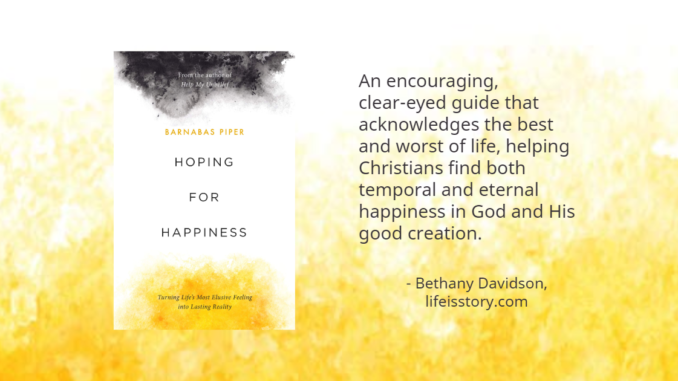
Also by this author: Gather, Belong, Welcome
Published by Good Book Company on October 1, 2020
Genres: Non-Fiction, Christian Life, Theology
Buy on Amazon
Goodreads

A biblical framework for living a grounded, hopeful, and genuinely happy life.
Everyone wants to be happy, and we all pursue happiness in different ways. Some people are thrill-seekers; others are homebodies. Some people are loners; others love big families or communities. Some people express things creatively; others consume what is created. Some sing; others listen to music. Whatever we find happiness in, we are united by our desire for work that matters and relationships that fulfill.
As Christians, we often fall into the trap of basing our hopes on earthly things, even when we know they only make us happy for a short time. But how are we to experience happiness in this life? How do we avoid expecting too much of earthly things and being disappointed, or expecting too little and becoming cynics?
In this book, recovering cynic Barnabas Piper helps us to throw off both the unrealistic expectations that end in disappointment and the guilty sense that Christians are not meant to have fun. He shows how having a clear view of the reality of the fall and the promise of redemption frees us to live a life that is grounded, hopeful, and genuinely happy.
Earlier this year, I reviewed another Barnabas Piper book, and I enjoyed it so much that as soon as I learned about this book, I knew that I wanted to read it too. Once again, I enjoyed Piper’s writing voice and sense of humor, and I deeply relate to his efforts to be a hopeful realist. Hoping for Happiness is full of honest, wise advice and solid biblical teaching, and even though Piper’s writing especially resonates with me because of my personality, this book can encourage any Christian. Piper shares lots of insights about managing expectations, not staking our hopes to things that will inevitably fail us, and dealing with trials, and he writes stirringly about how we can honor God by deeply enjoying His good gifts.
Piper pushes back against falsely pious perspectives that deny the importance of happiness. In the chapter “Evangeliguilt,” he writes about how wrong it is for evangelical Christians to feel guilty and apologetic for enjoying things, as if God’s good gifts are shallow and unimportant. He also challenges the platitude that God cares about our holiness, not our happiness. He shows based on Scripture and life experience why this true-sounding statement is misleading and damaging, and provides a better way forward from this false dichotomy.
There is something here for every Christian, regardless of their personality or tendencies. Whether someone is blindly optimistic, stuck in a rut of cynicism, dealing with crushed hopes, or afraid that their happiness is an offense to a suffering world, this book is full of strong Scriptural advice and life encouragement. Hoping for Happiness: Turning Life’s Most Elusive Feeling into Lasting Reality is an encouraging, clear-eyed guide that acknowledges the best and worst of life, helping Christians find both temporal and eternal happiness in God and His good creation.



